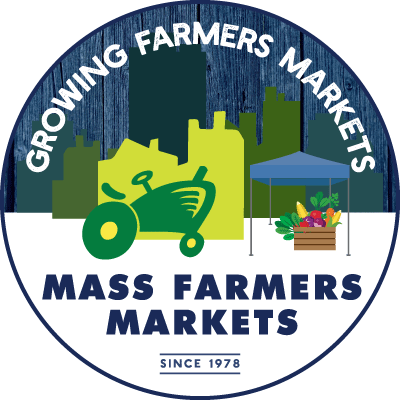Who We Are & What We Do
Mass Farmers Markets (MFM), established in 1978 as a 501(c)(3) charitable non-profit organization, is the leading statewide partner supporting over 200 farmers markets across the Commonwealth of Massachusetts. Our mission is to forge strong partnerships with farmers, consumers, and communities. Through these collaborations, we aim to bolster individual health, invigorate community vitality, and promote the sustainability of local farms. At the heart of our work lies a commitment to enhancing the accessibility and benefits of farmers markets, ensuring they serve as vital hubs for nourishment, education, and community engagement.
Our Initiatives Are Concentrated in 3 Core Areas
Membership Services
As a membership-based organization, MFM extends a variety of services to its members, including access to fiscal sponsorship, affordable liability insurance, and a plethora of training and educational opportunities. This membership model ensures markets have the year-round support necessary for their success.
Expert Advisory and Training
MFM offers specialized advisory services and training programs for farmers market managers. This initiative aims to empower managers with the knowledge and skills needed for effective market management, covering operational strategies, growth techniques, and sustainability practices.
Operational Consulting for New Markets
To foster the establishment of new markets, MFM provides operational consulting. This service is designed to assist in laying a solid groundwork for future success, focusing on market structure, vendor management, and customer engagement strategies.
Sustainability Planning Guidance
Recognizing the importance of long-term viability, MFM aids markets in developing robust sustainability plans. These plans are tailored to ensure markets remain vibrant and financially healthy for years to come.
Marketing and Technology Support
In an era where digital presence is vital, MFM assists markets with marketing strategies and technology solutions. This includes social media promotion, website development, and the implementation of market management software to streamline operations.
Advocacy
MFM stands as a voice for all Massachusetts farmers markets, engaging in advocacy efforts to address policy issues, secure funding, and promote the interests of farmers and consumers alike.
Healthy Food Incentives
MFM champions statewide incentives such as SNAP and the Healthy Incentives Program (HIP), working tirelessly to increase funding and support for these programs. These efforts not only make healthy food more accessible but also support local farmers.
Food Access Programs Development
In collaboration with city officials and agricultural commissioners, MFM has been pivotal in the creation and enhancement of programs like the Farmers Market Nutrition Program (FMNP) and the WIC Farmers Market Nutrition Coupon distribution initiative. These programs are designed to distribute nutritional benefits directly at farmers markets, thereby encouraging healthy eating habits among vulnerable populations.
Advocacy for Grants and Funding
MFM actively advocates for increased grants and funding to bolster food access initiatives, ensuring that nutritious food is within reach for those in high-need communities.
Urban Market Management
MFM oversees the operation of Copley Square Farmers Market in Boston, Central Square and Kendall Square Farmers Markets in Cambridge, and Davis Square Farmers Market in Somerville. These markets serve as essential hubs for over 50 vendors, offering a wide array of products from local farms, nurseries, bakeries, and specialty food producers.
Community Gathering Spaces
Beyond being venues for purchasing fresh, local produce, these markets are vibrant community gathering spaces. They offer a platform for consumers to engage directly with food growers and producers, fostering a sense of community and supporting the local economy.
Health Equity and Community Health Improvement
MFM's efforts align closely with the goals of Community Health Improvement Plans (CHIP), focusing on providing equitable access to food that nourishes both body and mind. By bridging the gap between farmer needs and local residents, MFM ensures the sustainability of community-led health education and equitable access to culturally relevant food.
Our Annual Programs
Our Strategic Goals
In 2022, Mass Farmers Markets concluded a two-year, statewide, conversation with our board and team members, member farmers, market managers, and community partners to set forth Strategic Goals that embody our commitment to sustainable agriculture and community enrichment. Crafted with foresight and purpose, these goals propel us toward a future where farmers markets flourish as dynamic community hubs. We invite you to explore our Strategic Goals which will shape Mass Farmers Markets into a catalyst for impactful, resilient, and community-driven change.
-
Ensuring diversity within Mass Farmers Markets is vital for fostering innovation, creativity, and a broad range of perspectives. Beyond the ethical imperative, a diverse team is better equipped to address the needs of our diverse customer base. Cultivating diversity among board members and team members contributes to a more inclusive decision-making process, leading to comprehensive strategies that resonate with various communities. Moreover, fostering diversity among vendors is an essential aspect of providing a marketplace that reflects the rich tapestry of Massachusetts food culture.
By emphasizing diversity among our customers, we aim to create an inclusive and welcoming atmosphere at our farmers markets. This involves reaching out to different demographics, understanding their unique needs, and tailoring our offerings accordingly. A diverse customer base not only strengthens our market resilience but also promotes a sense of community and belonging among all attendees.
-
Diversifying revenue streams is crucial for the long-term sustainability and growth of Mass Farmers Markets. By expanding our sources of income, we can better weather economic fluctuations and ensure stability for our employees. This strategic goal goes beyond mere financial growth; it is about creating year-round employment opportunities that adhere to a sustainable, living wage. This involves exploring new market trends, partnerships, and services that align with the values of our organization and the local agricultural community.
Achieving a living wage is not only an ethical commitment but also a strategy to attract and retain skilled individuals who are passionate about our mission. It means adhering to market norms while also pioneering innovative approaches to maximize revenue without compromising our core values. This financial stability is the foundation upon which we can build a resilient and impactful organization, capable of supporting farmers and contributing meaningfully to the local economy.
-
Storytelling is the key to demystifying the efforts and resources required to build, grow, and maintain farmers markets. It involves conveying the challenges, triumphs, and the genuine impact of our work. Narrating the journey of creating a farmers market is essential for dispelling "magical thinking" and fostering a realistic understanding of the commitment involved.
By investing in storytelling, we create a connection between our organization and the community. This involves sharing the personal stories of vendors, the dedication of our team, and the positive outcomes that result from supporting local agriculture. Through effective storytelling, we aim to not only raise awareness about the intricacies of our work but also to inspire greater community involvement, attracting the necessary resources and human capital to ensure the success of farmers markets.
-
Expanding our support and footprint across Massachusetts is a strategic move to strengthen the broader network of farmers markets. By collaborating with existing markets, we can share resources, knowledge, and best practices, fostering a more cohesive and resilient local food ecosystem. This involves providing assistance to emerging markets, sharing expertise on sustainable practices, and collaborating with local governments and organizations to create a conducive environment for farmers markets to thrive.
Increasing our footprint not only amplifies our impact but also reinforces the importance of farmers markets as essential components of local economies. This strategic goal emphasizes our commitment to the collective success of farmers markets across the Commonwealth, promoting a unified approach to support local agriculture and sustainable practices.
-
Sustainable farmers markets require continuous efforts to engage a diverse range of age groups. Focusing on a younger audience is crucial for the long-term viability of our organization. This involves creating initiatives and activities that resonate with younger demographics, highlighting the relevance of farmers markets in contemporary lifestyles.
Engaging a broader range of age groups goes beyond attracting customers; it's about developing the next generation of leaders, vendors, and advocates for local agriculture. By connecting with younger individuals, we aim to instill an appreciation for local food, sustainable practices, and community building. This strategic goal ensures the continuity of support for farmers markets by fostering a sense of ownership and responsibility among the future leaders, customers, and contributors to the success of Mass Farmers Markets.
Our History
Established in 1978, Mass Farmers Markets (MFM) was born from a partnership between the Massachusetts Department of Agricultural Resources (MDAR), the University of Massachusetts at Amherst Extension Service, and pioneering farmers across the state. This collaboration responded to a growing demand for farmers markets, recognizing the need for a centralized organization to sustain and nurture this burgeoning interest beyond government funding.
For over 45 years, MFM has been instrumental in developing, supporting, and providing training for farmers markets across the Commonwealth. As the sole organization dedicated to this cause, MFM champions the interests of the markets, the communities they serve, and the farmers who depend on them for livelihood.
In our journey towards becoming a more equitable and inclusive organization, MFM is actively enhancing diversity, equity, and inclusion (DEI) within our team, governance, and market operations. This includes participating in the Transformational DEI Certificate program offered by the Greater Boston Chamber of Commerce, ensuring our commitment to making food accessible to all is embedded in every aspect of our work.








